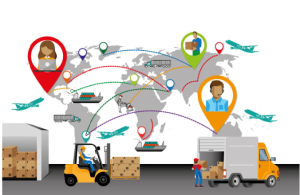Table of Contents
Understanding the Synergy: ERP and Supply Chain Management
In the dynamic landscape of business operations, Enterprise Resource Planning (ERP) and Supply Chain Management (SCM) play pivotal roles in enhancing efficiency, collaboration, and decision-making. Let’s delve into the intricacies of ERP and SCM, exploring their individual functions and the synergies they create when integrated.

1. What is ERP?
Enterprise Resource Planning (ERP) is a comprehensive business process management software designed to streamline and automate various back-office functions related to technology, services, and human resources. ERP systems enable organizations to digitally transform their processes by integrating applications and functions into a cohesive system.
ERP Functions
- Integrated Applications: ERP systems connect diverse business functions and departments into a unified platform.
- Automation: Back office functions, including finance, human resources, manufacturing, and distribution, are automated for increased efficiency.
- Digital Transformation: Organizations leverage ERP to undergo a digital transformation of their business processes.
2. The Essence of Supply Chain Management (SCM)
Supply Chain Management (SCM) involves the management of the flow of goods and services, encompassing processes that transform raw materials into final products. This includes the coordination and collaboration with channel partners, such as suppliers, intermediaries, third-party service providers, and customers.
SCM Processes
- Goods Flow: SCM manages the movement and storage of raw materials, work-in-process inventory, and finished goods.
- Coordination with Partners: SCM involves collaboration with channel partners for procurement, logistics, and order fulfillment.
- End-to-End Visibility: SCM strives to provide visibility across the supply chain from sourcing to delivery.
3. Integration of ERP and SCM
The seamless integration of ERP and SCM is a game-changer for organizations. ERP serves as the transactional system of record across core business functions, while SCM optimizes supply chain operations.
Benefits of Integration
- Visibility: Organizations gain end-to-end visibility into their supply chain, allowing for better planning and execution.
- Efficiency: Integration enhances control and efficiency by aligning core business functions and supply chain operations.
- Demand Signal Utilization: ERP and SCM integration enables organizations to efficiently respond to demand signals from customers.
4. Leveraging ERP for Supply Chain Management
Modern ERP systems facilitate the integration of supply chain management functions, offering a centralized database for procurement, production planning, inventory, distribution, and logistics.
ERP in SCM
- Centralized Database: ERP systems provide a centralized database for managing procurement, production, and distribution processes.
- Digital Connectivity: Key suppliers can be digitally connected to the ERP system, enhancing coordination in demand and supply planning.
5. Achieving End-to-End Optimization
The evolving landscape of business operations requires organizations to adopt integrated solutions for end-to-end optimization. ERP and SCM, when harmoniously integrated, empower organizations to navigate challenges efficiently.
End-to-End Optimization
- Procurement to Delivery: Integration allows for streamlined processes from procurement to product delivery.
- Digital Coordination: Digital connectivity with suppliers ensures effective demand and supply planning.
Conclusion: Unleashing the Potential
In conclusion, the synergy between ERP and SCM is a strategic move for organizations aiming to enhance their competitiveness and responsiveness. The integration of these systems opens avenues for improved collaboration, informed decision-making, and streamlined operations.
Frequently Asked Questions (FAQs)
Q1: How does ERP contribute to digital transformation?
A: ERP contributes to digital transformation by integrating various business functions into a cohesive system, automating processes, and providing a platform for organizations to evolve digitally.
Q2: What are the key benefits of ERP and SCM integration?
A: The integration of ERP and SCM offers benefits such as enhanced visibility, improved efficiency, and the ability to respond effectively to demand signals from customers.
Q3: How does SCM contribute to the flow of goods in a supply chain?
A: SCM manages the movement and storage of raw materials, work-in-process inventory, and finished goods, ensuring a smooth flow from the point of origin to the point of consumption.
Q4: Why is end-to-end optimization crucial in modern business operations?
A: End-to-end optimization ensures streamlined processes from procurement to delivery, enhancing overall efficiency and responsiveness in the face of dynamic market demands.
Q5: Can ERP systems be customized for specific industry needs?
A: Yes, ERP systems can be customized to meet the specific needs of different industries, providing tailored solutions for diverse business requirements.
